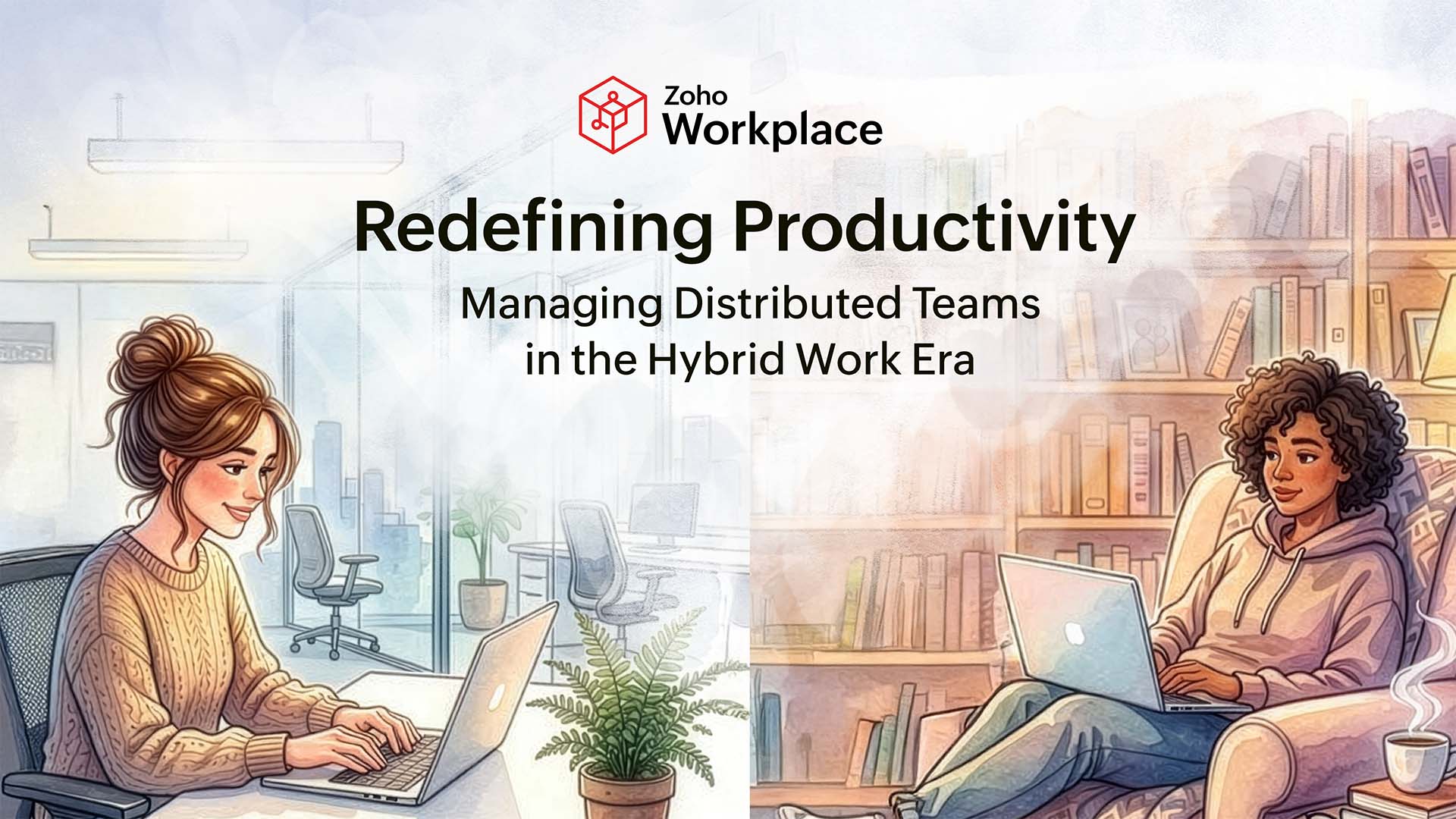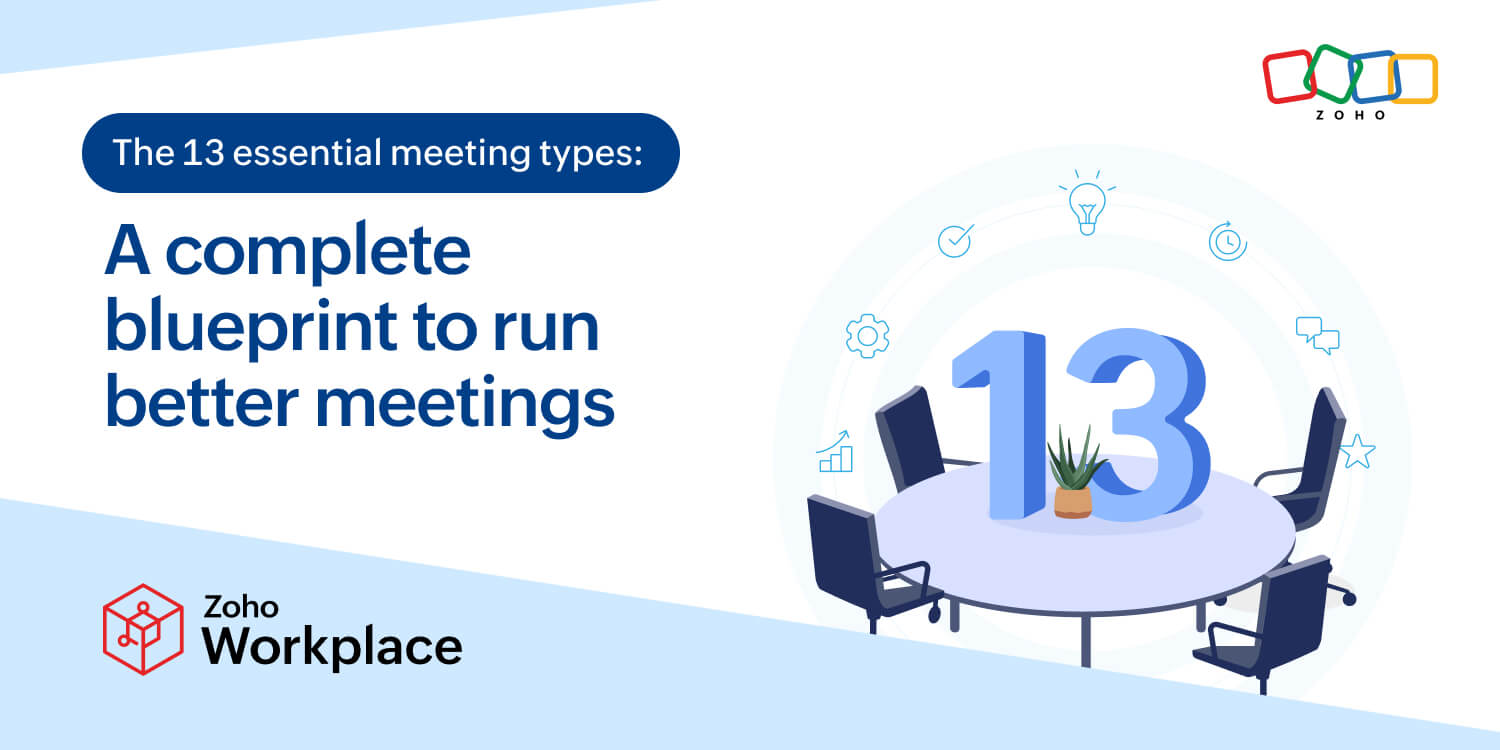- HOME
- All Topics
- Productivity in the workplace
- How to become a digital nomad (and why you should want to)
How to become a digital nomad (and why you should want to)
- Published : November 29, 2024
- Last Updated : December 6, 2024
- 800 Views
- 8 Min Read
For some people, a regular routine is essential. They like to get up at the same time each day, go to work in the same office, and decompress at the same local spot with their group of friends. But where regularity and routine can feel productive and comforting for some, it’s a cage for others. Some people want to feel the total freedom of waking up in a different country from the one they were born in and being able to pack their bags and go to a completely new environment whenever they feel like it.
They’re not wanderers or travelers. They’re digital nomads, and one might be sitting in on your next Zoho Meeting.
What is a digital nomad?
A nomad is someone who travels frequently, with no fixed place to call home. The term comes from history and anthropology, where it’s used to describe groups of people who travel together from place to place throughout their lives rather than settling in permanent villages and cities.
A digital nomad has a similar lifestyle. They might backpack through Europe, fly from place to place in Asia, or even just road trip across the Americas. But while they’re doing this, they’re also working from their laptop wherever they can find a solid internet connection.
Not all remote workers are digital nomads; most just work from their own home. Digital nomads are remote workers who use the opportunity to work from anywhere to really work from anywhere.
The pros and cons of being a digital nomad
While being able to work from anywhere might sound like a dream, it’s not for everyone. Like remote, hybrid, and in-office work, being a digital nomad comes with its pros and cons.
The pros and cons of being a digital nomad | |
Pros | Cons |
✅Great for those who love to travel | ❌Not so great for those who don’t like change |
✅Network and build relationships around the world | ❌Less connection with coworkers |
✅Squeezing in some extra work | ❌More risk of burnout |
✅Unlocking new opportunities for employers | ❌A single bad travel experience can mess up your whole workweek |
Pro: Great if you love traveling
Know someone in your network who absolutely loves to travel? They're probably the most likely to benefit from being a digital nomad. Instead of needing to use all of their paid time off on all of their travel plans, they can see the world without feeling like they're putting their career on hold.
Con: Lots of change
If you love having a predictable routine, being a digital nomad might not be for you. Sure, you can establish a routine whenever you land somewhere, but digital nomads rarely stay in one place for too long before moving on to a new location. Otherwise, they’d be more like remote workers than true digital nomads.
Pro: Great for networking
While we love making new LinkedIn friends just as much as anyone, imagine if you could make these connections in person, anywhere in the world. Whether it’s bumping into a leader you admire at your airport gate or finding your next boss at the beach in the Bahamas, being a digital nomad can expose you to tons of new networking opportunities.
Con: Feeling disconnected from coworkers
When you only see your coworkers through chat messages and video calls, it can be hard to feel connected to them. You might start to feel distant because in-office experiences allow the rest of the team to become more tight-knit while you’re always on the outside looking in.
Pro: Squeezing in extra work
There’s a lot of waiting in traveling. When you’re a digital nomad, all that extra time can become productive time. If you have flexible hours, you can put that flight delay to use and close out important tasks so you can relax later.
Con: More risk of burnout
The opportunity to squeeze more work into your day can have some negative consequences, too. Forbes found that 69% of remote workers say they experience more burnout because of the digital tools they use to work and communicate. When those tools are your only line to your coworkers and your boss—and they’re always accessible—that can take its toll on you.
Pro: More opportunities
If your employer has connections throughout the world, being a digital nomad can make you a fantastic asset for them. Even with emails, meeting and chat tools, nothing beats an in-person visit for those important projects. If you’re already nomadic, it’s easier for you to travel and help your employer make the most of these opportunities. They’ll be a great help to your career, too.
Con: Prepare for the unexpected
An unexpected networking or business opportunity is a great surprise. A hostel that doesn’t really match the pictures you saw online isn’t. While an unfortunate travel experience can derail you temporarily when you’re on vacation, it can completely mess up your workday, or even your entire workweek, as you try to fix the situation.
How to become a digital nomad
It may seem like being a digital nomad is as simple as hopping on a plane, finding an internet connection, and getting to work. But in practice, there are a few things you have to get in order before you can start working from that beach in Bali.
Step 1: Make sure you have a job that supports this lifestyle
Not every job or every employer is suited to being a digital nomad. Whether it’s a company with a strict in-office policy or a position that requires a lot of hands-on work, you might have to clear a few hurdles before you can pack your bags.
If your employer seems resistant to the idea, try to find a way to make this arrangement work for them. You can emphasize some of the benefits of being a digital nomad, like being more available for business trips. You can also point to successful digital nomads as examples you aim to follow.
If the job is the issue, you might need to consider a different career path—or start your own business—to become a digital nomad.
Step 2: Pick the right destination
One of the advantages of being a digital nomad is you don’t have to stay in one place longer than you want to. Still, you’ll want to make sure the first destination you pick meets the following criteria:
Personal preference: If you can’t handle a harsh winter, you might not want to work from a country like Iceland or Sweden. If beaches are a must, you’ll want to look at places in the Caribbean or the Pacific.
Work visas: In some countries, you’ll need a work visa. You’ll want to make sure you’re actually able to get one if that’s the case.
Taxes: Most countries have a tax code that isn’t particularly friendly towards digital nomads. They’ll still expect you to declare a permanent residence and an official employment status. Try and pick a country where that isn’t the case.
Safety: Not every country is as safe as your hometown. Make sure you review your government’s travel advisories to see which destinations you should avoid.
Language: Ideally, you should try and work from a country where you can speak the language, or at least where your language is common enough that most people will understand you.
Step 3: Start building your community
Traveling on your own can seem exciting and adventurous until you step off the plane and there’s no one to greet you. If you’re particularly vulnerable to feeling lonely and isolated, put some time into building your network in the country you’ll be working from. That can be fellow digital nomads, locals in your industry, or even just potential new friends for any downtime!
Step 4: Get all of your affairs in order
Before you make the jump into your new digital nomad lifestyle, there are a few technical things you need to take care of:
Your current home: Whether you rent or own your home, you need to figure out what you’ll do with it while you’re working abroad. That can mean breaking your lease or even selling your home.
Your passport: Do you have a passport? Is it up to date?
Health insurance: If you get sick or injured while you’re working abroad, you might find yourself paying for significant out-of-pocket expenses. That’s why digital nomads usually get some sort of health insurance.
Internet: Will you be relying on internet cafés and free wifi? Or maybe you’ll get a robust mobile plan with lots of data for roaming? It's recommended to use a Virtual Private Network (VPN) for a secure internet connection, when it comes to work.
Money: Does your current bank have a presence in the country you’ll be working in? If not, what will you do if your wallet gets stolen? Talking with your bank is the best way to get all your ducks in a row.
Step 5: Bon voyage!
With everything else in order, all that’s left is to pack your bags, book your tickets (or hit the road), and start your new adventure as a digital nomad!
5 tips for digital nomads
Build a career where this lifestyle is sustainable
Some careers aren’t as suited to being a digital nomad as others. If you’re constantly fighting with your boss to stay abroad, you’re quickly going to start to wonder if this is the lifestyle for you. But if it is, making a career change might be the best thing you ever did.
Examples of careers that suit this lifestyle perfectly include:
Freelancing
Content creation
Web development
Digital marketing
Writing
Programming
Graphic design
Journalism
Translation
Make socializing a priority
When you’re working remotely, it’s all too easy to clock in a few extra hours, spend less time with friends, and put your nose to the grindstone. If you’re working in a new place where you don’t really know anyone, this becomes even more tempting. Go out of your way to meet like-minded people and spend time with these new friends.
Don’t hesitate to switch it up
While being a digital nomad encourages you to travel more, once you find your groove in a particular city, you might be tempted to stay there. That’s perfectly fine! Just don’t let that get in the way of experiencing new things.
Stay in touch with friends back home
It can be hard to fulfill all of your work obligations, make new friends as you travel, and stay in touch with everyone back home. But those connections you made in life before starting your journey as a digital nomad can be incredibly valuable, even from afar.
Don’t forget to take time off
Digital nomads travel as part of their work, so it can feel like you’re constantly on vacation. But constant work can take its toll on you, so make sure you plan some time off to actually explore the new places you’re working from without worrying about your next deadline.
Have work, will travel
Being a digital nomad can combine your love of traveling with the work you’re passionate about, making it the best of both worlds for workers with jobs well-suited to it. Just remember that it’s not all upside and that you’ll have to do a bit of planning to make it work for you. But once you start, you might not ever want to go back.
 Genevieve Michaels
Genevieve MichaelsGenevieve Michaels is a freelance writer based in France. She specializes in long-form content and case studies for B2B tech companies. Her work focuses on collaboration, teamwork, and trends happening in the workplace. She has worked with major SaaS brands and her creative writing has been published in Elle Canada, Vice Canada, Canadian Art Magazine, and more.


